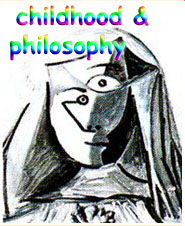philosophical inquiry with indigenous children: an attempt to integrate indigenous knowledge in philosophy for/with children
DOI:
https://doi.org/10.12957/childphilo.2019.42659Keywords:
indigenous forms of knowledge, indigenous philosophy, presentational epistemology, philosophy for/with childrenAbstract
In this article, I propose to integrate indigenous knowledges in the Philosophy for/with Children theory and practice. I make the claim that it is possible to treat indigenous knowledges, not only as topics for philosophical dialogues with children but as presuppositions of the philosophical activity itself within the Community of Inquiry. Such integration is important for at least three (3) reasons: First, recognizing indigenous ways of thinking and seeing the world informs us of other non-dominant forms of knowledges, methods to produce knowledge and criteria to determine knowledge. Second, the dominance of western standards of producing and determining knowledge, especially in non-western societies, needs to be reduced, balanced and informed by local knowledges and experiences. And third, indigenous knowledges reinforce a culturally responsive P4wC that responds to the challenges arising in multicultural and ethnically diverse classrooms. There are two (2) possible intersections where such integration may take place, namely: a) Epistemology, where I claim that the integration of a “presentational epistemology” immanent in indigenous patterns of thinking provides a counterweight to Lipman’s strong adherence to analytic-representational epistemology, and b) Pedagogy, which takes shape in an “indigenized” Community of Inquiry that highlights the values of interconnectedness, situatedness and relationality.
References
Doyo, Ma. Ceres. "Here’s to the Kalinga Brave!" in Philippine Daily Inquirer @inquirerdotnet, April 23, 2015, https://opinion.inquirer.net/84364/heres-to-the-kalinga-brave
Grenier, Louise. Working with Indigenous Knowledge: A Guide For Researchers, Ottawa: International Development Research Centre, 1998.
Hill, Gus and Alicia Wilkinson, “INDIGEGOGY: A Transformative Indigenous Educational Process”, in Canadian Social Work Review / Revue canadienne de service social, Vol. 31, No. 2 (2014), pp. 175-193.
Kohan, Walter Omar & David Knowles Kennedy, "On the Risks of Approaching a Philosophical Movement Outside of Philosophy" in Childhood and Philosophy, v.13, n.28, 2017, 493-503, doi: 10.12957/childphilo.2017.29954.
Lipman, Matthew, Ann Margaret Sharp, and Frederick Oscanyan, Philosophy in the Classroom, 2nd ed. Philadelphia: Temple University Press, 1980.
Lipman, Matthew. Thinking in Education 2nd ed. New York: Cambridge University Press, 2003.
Makaiau, Amber Strong. "Philosophy for Children Hawai’i: A Culturally Responsive Pedagogy for Social Justice Education" in Inclusion, Diversity, and Intercultural Dialogue in Young People’s Philosophical Inquiry, eds.
Ching- Ching Lin Touro, and Lavina Sequeira, Rotterdam, Sense Publishers, 2017.
Martin, Brian. “Methodology is Content: Indigenous Approaches to Research and Knowledge”, in Educational Philosophy and Theory, 2017, DOI: 10.1080/00131857.2017.1298034.
Odierna, Rebecca. “Philosophy for Children Kenyan Style”, in Educational Perspectives, Volume 44, Numbers 1 and 2.
Raymond Pierotti, Indigenous Knowledge, Ecology, and Evolutionary Biology. New York: Taylor & Francis, 2011.
Reed-Sandoval, Amy. “The Oaxaca Philosophy for Children Initiative as Place-Based Philosophy: Why Context Matters in Philosophy for Children,” in APA Newsletter Hispanic/Latino Issues In Philosophy, Vol. 14, No. 1, 2014.
Sam, Michele A. & Ktunaxa, “An Indigenous Knowledges Perspective on Valid Meaning Making: A Commentary on Research with the EDI and Aboriginal Communities” in Social Indicators Research, Vol. 103, No. 2, Validation Theory And Research For A Population-Level Measure Of Children's Development, Wellbeing, And School Readiness (September 2011), pp. 315-325.
Semali, Ladislaus M. & Joe L.Kincheloe, “What is Indigenous Knowledge and Why Should We Study It?”, in What Is Indigenous Knowledge? Voices From The Academy, eds. Ladislaus M.Semali & Joe L.Kincheloe, New York: Falmer Press, 1999.
Styres, Sandra D. “Land as First Teacher: A Philosophical Journeying”, in Reflective Practice, 12:6, 717-731, (2011), DOI: 10.1080/14623943.2011.601083.
van der Velden, Miguel. "Indigenous Philosophies" in Philosophy Now, Issue 127, August/September, 2018, https://philosophynow.org/issues/127/Indigenous_Philosophies
Wang, Jessica Ching-Sze. “From Learning Outcomes to Educational Possibilities – What happens when Philosophical Community ‘Works Wonders’ with University Students in Taiwan,” in Analytic Teaching and Philosophical Praxis, Vol. 36, 2015-2016.
Whitt, Laurelyn. Science, Colonialism, and Indigenous Peoples: The Cultural Politics Of Law And Knowledge, New York: Cambridge University Press, 2009.
http://www.un.org/en/events/indigenousday/
www.my.icpic.org




